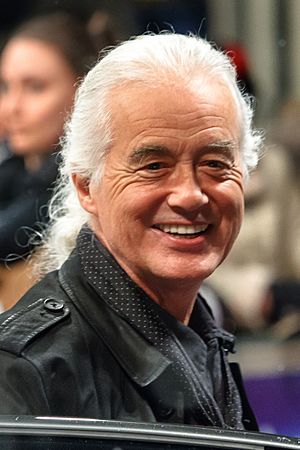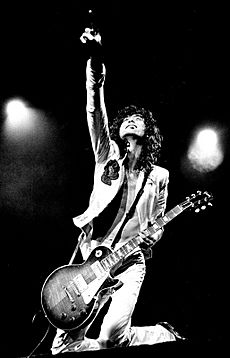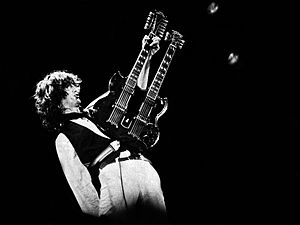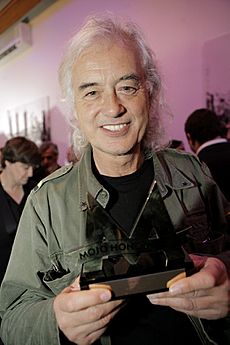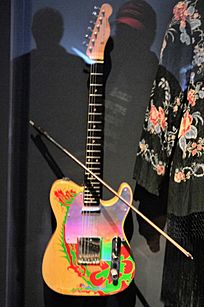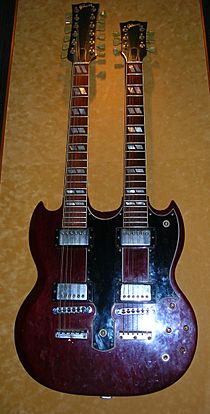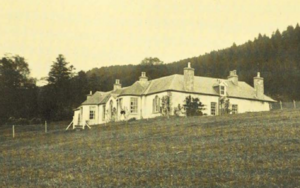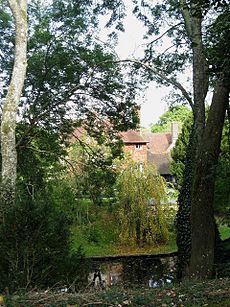Jimmy Page facts for kids
James Patrick Page (born 9 January 1944) is an English musician and producer. He became famous worldwide as the guitarist and founder of the rock band Led Zeppelin.
Page started his career as a studio musician in London. By the mid-1960s, he was one of the most popular guitarists for recording sessions in Britain. He was a member of the Yardbirds from 1966 to 1968. After the Yardbirds broke up, he formed Led Zeppelin, which was active from 1968 to 1980.
After the death of Led Zeppelin's drummer John Bonham in 1980, Page played with other groups like the Firm, the Honeydrippers, Coverdale–Page, and Page and Plant. He also performed as a guest with many artists, both live and in the studio. In 2007, he took part in a Led Zeppelin reunion concert, which was later released as the 2012 film Celebration Day. He also appeared in the 2008 documentary It Might Get Loud with the Edge and Jack White.
Many people consider Page to be one of the greatest and most important guitarists ever. Rolling Stone magazine called him a "power riffing" master. They ranked him number three on their 2015 list of the "100 Greatest Guitarists of All Time." He was also ranked number two on Gibson's list of "Top 50 Guitarists of All Time" in 2010. Page was inducted into the Rock and Roll Hall of Fame twice: once with the Yardbirds in 1992 and again with Led Zeppelin in 1995.
Contents
- Early Life and Musical Beginnings
- Becoming a Studio Musician
- The Yardbirds Era
- Led Zeppelin: A Rock Legend
- Music Projects in the 1980s
- Collaborations in the 1990s
- Recent Years: 2000s and 2010s
- 2020s and Beyond
- Musical Style and Impact
- Recording Techniques
- Instruments and Gear
- Personal Life
- Discography
- Images for kids
- See also
Early Life and Musical Beginnings
Page was born in Heston, west London, on 9 January 1944. His father worked as a manager at a plastic factory, and his mother was a doctor's secretary. In 1952, his family moved to Feltham, and then to Epsom in Surrey.
Page found his first guitar, a Spanish guitar, at his home when he was 12. He took a few lessons but mostly taught himself by listening to records. He spent many hours practicing his guitar. He even took it to school, but it was often taken away until after class.
Some of Page's early inspirations were rockabilly guitarists Scotty Moore and James Burton. They both played on recordings by Elvis Presley. Page said that Presley's song "Baby Let's Play House" made him want to play guitar.
When he was 13, Page appeared on a TV talent show called All Your Own with his skiffle band. Skiffle was a popular music style in England at the time. When asked about his future, Page said he wanted to do "biological research" to find a cure for cancer.
Page played in several early bands, including Malcolm Austin and Whirlwinds, and The Paramounts. He found it hard to find other musicians to play with regularly. He later joined Neil Christian's band, the Crusaders, and toured with them for about two years.
While touring, Page became very sick with glandular fever. He decided to take a break from music and study painting at Sutton Art College. He later explained that touring was making him ill, and he needed to recover. Even while studying art, he continued to play guitar.
Becoming a Studio Musician
While still a student, Page often played on stage at the Marquee Club with bands like Cyril Davies' All Stars and Alexis Korner's Blues Incorporated. He also played with other guitarists like Jeff Beck and Eric Clapton.
Mike Leander from Decca Records offered Page regular work in the studio. His first recording session for Decca was for the song "Diamonds" by Jet Harris and Tony Meehan. This song became a number one hit in early 1963.
After playing with a few other bands, Page decided to become a full-time studio musician. He was known as 'Lil' Jim Pea' to avoid confusion with another famous session guitarist, Big Jim Sullivan. Page was often called in as a backup or second guitarist for recordings. He said he rarely knew what he would be playing beforehand, but he learned a lot from these sessions.
Page became the favorite session guitarist for producer Shel Talmy. This led to him playing on songs for famous bands like the Who and the Kinks. He played acoustic guitar on two songs from the Kinks' first album. He also played rhythm guitar on the Who's first single, "I Can't Explain".
In 1965, Page was hired by Andrew Loog Oldham, who managed the Rolling Stones. Page worked as a producer and talent scout for Immediate Records. This allowed him to play on and produce songs for artists like John Mayall and Chris Farlowe.
Page played on many famous songs during this time, including Marianne Faithfull's "As Tears Go By", Shirley Bassey's "Goldfinger", and Petula Clark's "Downtown". He also played guitar on some of the Beatles' 1964 film A Hard Day's Night.
Page often said it was hard to remember all the songs he played on because he did so many sessions. He sometimes did "three sessions a day, fifteen sessions a week." He played with different groups, on film music, and folk sessions.
Page stopped doing studio work when popular music started using more brass and orchestral sounds instead of guitars. He felt his time as a session player was very valuable. He learned a lot about recording and playing different styles of music.
The Yardbirds Era
In late 1964, Page was asked to replace Eric Clapton in the Yardbirds, but he said no because of his friendship with Clapton. When Clapton left in February 1965, Page was offered the spot again. He suggested his friend Jeff Beck instead, as he didn't want to give up his busy studio work.
On 16 May 1966, Page, Jeff Beck, John Paul Jones, Keith Moon, and Nicky Hopkins recorded a song called "Beck's Bolero". This experience gave Page the idea to form a new "supergroup" with Beck, Moon, and John Entwistle from The Who. However, this plan didn't work out. During this time, Moon joked that the band would go down "like a lead balloon," which later inspired the name "Led Zeppelin."
Soon after, Page joined the Yardbirds when their bass player, Paul Samwell-Smith, left. Page first played bass, then switched to playing lead guitar alongside Jeff Beck. They released one single together, "Happenings Ten Years Time Ago".
After Beck left, the Yardbirds continued as a four-person band. They recorded one album with Page on lead guitar, called Little Games. The album didn't do very well, but the band's live shows became heavier and more experimental. These concerts showed musical ideas that Page would later develop with Led Zeppelin, especially in songs like "Dazed and Confused".
In 1968, the Yardbirds broke up. Page decided to form a new group to finish their tour dates in Scandinavia. He brought in singer Robert Plant and drummer John Bonham. John Paul Jones also asked to join. During the tour, the new group was called the New Yardbirds. Soon, Page decided to use the name "Led Zeppelin" for his new band. Their manager, Peter Grant, changed it slightly to "Led Zeppelin" to make sure people pronounced it correctly.
Led Zeppelin: A Rock Legend
Led Zeppelin became one of the best-selling music groups in history. They sold over 200 million albums worldwide. In the United States, they are the second-best-selling band. All nine of their studio albums reached the top 10 on the US Billboard album chart, and six of them reached number one.
Led Zeppelin helped create the sounds of heavy metal and hard rock. Page's work as a producer and musician was a big part of their unique sound. The band's style was influenced by many different types of music. They went on many record-breaking concert tours.
Page had a clear vision for Led Zeppelin from the start. He wanted to combine blues, hard rock, and acoustic music with powerful choruses. He aimed for a mix of "light and shade" in their music, meaning quiet and loud parts.
Led Zeppelin broke up in 1980 after the death of their drummer, John Bonham. Page was very sad and didn't want to play guitar for a while. For the rest of the 1980s, he worked on different projects, including film soundtracks and short-term collaborations with other bands. He also started doing charity work.
Music Projects in the 1980s
In March 1981, Page returned to the stage at a Jeff Beck show. Later that year, he formed a supergroup called XYZ with Yes bassist Chris Squire and drummer Alan White. They rehearsed, but the project didn't continue. Some of their music ideas were later used in other bands.
In 1982, Page worked on the soundtrack for the film Death Wish II. He recorded this and other projects at his own studio, The Sol, in Cookham.
In 1983, Page played at the A.R.M.S. charity concerts. These shows raised money for Multiple Sclerosis research and honored bassist Ronnie Lane, who had the disease. Page played songs from his Death Wish II soundtrack and an instrumental version of "Stairway to Heaven."
Page then teamed up with singer Paul Rodgers to form the band The Firm. They released two albums: The Firm in 1985 and Mean Business in 1986. The band toured but eventually split up.
Page also worked on other projects. He played on Graham Nash and Stephen Stills' albums, and on a Rolling Stones single. In 1986, he reunited with his former Yardbirds bandmates for the Box of Frogs album Strange Land.
In 1988, Page released his solo album called Outrider. Robert Plant also contributed to this album. Page then played on Plant's solo album Now and Zen in the same year.
During these years, Page also performed with the other former members of Led Zeppelin a few times. One notable performance was at the Live Aid concert in 1985. In 1988, Page, Plant, and Jones, along with John Bonham's son Jason Bonham, played at the Atlantic Records 40th Anniversary show.
Collaborations in the 1990s
In 1990, Page joined Robert Plant on stage at a Knebworth concert to perform some Led Zeppelin songs. He also appeared with Aerosmith at the Monsters of Rock festival.
In 1993, Page worked with David Coverdale, the singer from the band Whitesnake. They released an album called Coverdale–Page and went on a short tour in Japan.
In 1994, Page and Robert Plant reunited as Page and Plant for an Unplugged special. This show, called Unledded, was very popular and had the highest ratings in MTV's history at the time. The session was released as the live album No Quarter: Jimmy Page and Robert Plant Unledded.
After a successful tour, Page and Plant recorded the album Walking into Clarksdale in 1998. This album included the Grammy Award-winning songs "Most High" and "Please Read the Letter".
Page was also very involved in improving the sound quality of the Led Zeppelin albums for new releases. He participated in various charity concerts and worked with the Action for Brazil's Children Trust (ABC Trust), which his wife Jimena Gomez-Paratcha founded in 1998.
In 1998, Page played guitar for rap artist Puff Daddy's song "Come with Me". This song used parts of Led Zeppelin's "Kashmir" and was on the soundtrack for the movie Godzilla. They later performed the song on Saturday Night Live.
In 1999, Page teamed up with the band the Black Crowes for six shows. They played songs from Led Zeppelin and old blues and rock songs. Two of these concerts were recorded and released as a live album called Live at the Greek in 2000.
Recent Years: 2000s and 2010s
After the live album, Page and the Black Crowes continued to work together, joining a tour with the Who in 2000.
In 2005, Page was given the Officer of the Order of the British Empire (OBE) award for his charity work in Brazil. He also became an honorary citizen of Rio de Janeiro and won a Grammy Lifetime Achievement Award with Led Zeppelin.
In November 2006, Led Zeppelin was inducted into the UK Music Hall of Fame. Page received an award and gave a short speech.
On 10 December 2007, the surviving members of Led Zeppelin, along with John Bonham's son Jason Bonham, played a charity concert at the O2 Arena in London. This concert set a world record for the "Highest Demand for Tickets for One Music Concert," with 20 million online requests.
On 7 June 2008, Page and John Paul Jones performed with the Foo Fighters at their concert at Wembley Stadium. They played "Rock and Roll" and "Ramble On". In August 2008, Page, David Beckham, and Leona Lewis represented Britain at the 2008 Summer Olympics closing ceremonies, performing "Whole Lotta Love".
In 2008, Page helped produce a documentary film called It Might Get Loud. The film explores the history of the electric guitar through the careers of Page, The Edge, and Jack White.
In January 2010, Page announced he would release an autobiography. He was also honored with the first-ever Global Peace Award by the United Nations' Pathways to Peace organization.
On 3 June 2011, Page played with Donovan at the Royal Albert Hall in London. He also made a surprise appearance with The Black Crowes in London in July 2011. In November 2011, he played with Roy Harper at Harper's 70th birthday concert.
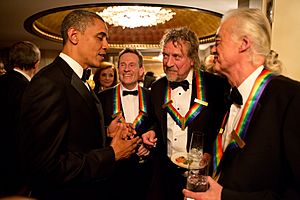
In December 2012, Page, Plant, and Jones received the annual Kennedy Center Honors from President Barack Obama. This is the highest U.S. award for those who have influenced American culture through the arts. In 2013, Led Zeppelin won a Grammy Award for "Best Rock Album" for Celebration Day.
In May 2014, Page received an honorary doctorate from the Berklee College of Music in Boston. In an interview, Page expressed his desire to play more concerts with Led Zeppelin, but Plant stated that the chances of a reunion were "zero." Page later said he was "fed up" with Plant's refusal to play.
In September 2014, Page announced that he would start a new band and perform music from his entire career, including his early days with The Yardbirds and new material.
In December 2015, Page was featured in a two-hour radio program called Johnny Walker Meets. In October 2017, he spoke about his music career at the Oxford Union.
2020s and Beyond
Page was interviewed for the documentary film If These Walls Could Sing, which is about the recording studios at Abbey Road.
In September 2024, Page was honored by the Academy of Achievement at the British Embassy in Washington, D.C.. He was recognized for over five decades of making music and for his charity work.
Musical Style and Impact
Page is seen by many as one of the greatest and most important guitarists of all time. His experiences in the studio and with the Yardbirds were very important to Led Zeppelin's success. As a producer, songwriter, and guitarist, he helped make Led Zeppelin a model for many bands. He greatly influenced the rock sound of his time and many other guitarists.
Guitar Player magazine called Page "one of rock music’s ultimate riff masters, guitar orchestrators and studio revolutionaries."
Many famous guitarists have been influenced by Page, including Eddie Van Halen, Joe Satriani, Kirk Hammett, Slash, and Steve Vai. Queen's Brian May said that Page was one of the "great brains of rock music" and a master of writing guitar riffs.
Page saw himself as a composer first. He compared his way of writing songs to classical music, saying he would "build up harmonies, orchestrating the guitar like an army." He created many guitar riffs and used different guitar tunings and melodic solos. His sound often included aggressive, distorted guitar tones. He also played acoustic guitar with influences from folk and Eastern music.
Page is known for sometimes playing his guitar with a cello bow. This creates a unique, droning sound. His acoustic guitar playing was described as unusual, full of unexpected shapes and changes.
Page often recorded himself playing guitar ideas on a cassette recorder. He would then listen back and pick out the best parts to put together into songs. This helped him create many of Led Zeppelin's famous tracks.
Recording Techniques
Page is known for new ways of recording sound in the studio while with Led Zeppelin. He learned many of these techniques as a session musician. He learned about placing microphones and what worked and didn't work for different instruments. He felt that drums often sounded bad in recordings because they were put in small, dead-sounding rooms.
Page liked older recording techniques from the 1950s, especially those used at Sun Studio. He believed in the idea that "distance equals depth" in recording. He would place an extra microphone far away from the amplifier, sometimes 20 feet away. Then he would record the mix of the close and distant microphones. This way, Page was one of the first British producers to capture a band's "ambient sound," which is the natural sound of the room.
For some Led Zeppelin songs, like "Whole Lotta Love" and "You Shook Me", Page used a technique called "reverse echo". He said he invented this technique while with the Yardbirds. It involves hearing the echo of a sound before the main sound itself. He achieved this by reversing the tape, adding the echo, and then flipping the tape back.
Page also said that he purposely changed the sound engineers for Led Zeppelin albums. He wanted people to know that he was responsible for the band's sound, not just the engineers.
John Paul Jones agreed that Page's production techniques were a key reason for Led Zeppelin's success. He mentioned Page's "backwards echo stuff" and his microphone techniques, like using small amplifiers but miking them very well.
Page said that many people thought of him as just a riff guitarist. But he saw himself more broadly as a record producer. He wanted to be remembered as someone who helped a talented band grow and capture their best music on tape.
Instruments and Gear
Guitars
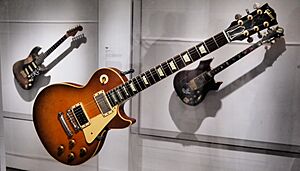
For most Led Zeppelin recordings from their second album onward, Page used a Gibson Les Paul guitar. This guitar was sold to him by Joe Walsh. He used it with Marshall amplifiers.
For the first Led Zeppelin album and the solo in "Stairway to Heaven," he used a Fender Telecaster that was a gift from Jeff Beck. He also used a Danelectro 3021 guitar, often tuned to DADGAD, especially for live performances of "Kashmir".
Page is famous for playing his guitar with a cello bow. He used this technique in live versions of songs like "Dazed and Confused" and "How Many More Times". He developed this technique during his time as a session musician.
Notable Guitars
- 6-string electric guitars
- 1959 Fender Telecaster (The Dragon): This guitar was given to Page by Jeff Beck. Page repainted it with a colorful dragon design. He used it with the Yardbirds and for recording the first Led Zeppelin album. It was also used for the "Stairway to Heaven" solo.
- 1959 Gibson Les Paul Standard (No. 1): This guitar was bought from Joe Walsh. Gibson later used this guitar as a model for their special Jimmy Page signature guitars.
- 1959 Gibson Les Paul Standard (No. 2): This guitar had its neck shaped to match his No. 1. Page added special switches to it after Led Zeppelin broke up. He often used it for different guitar tunings.
- 1961 Danelectro 3021: Tuned to DADGAD, this guitar was used live for songs like "White Summer" and "Kashmir."
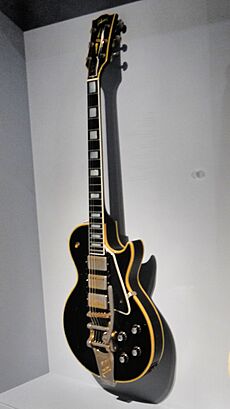
- 1960 Black Gibson Les Paul Custom: This guitar was stolen in 1970 but was returned to him in 2015. Gibson later made special copies of this guitar.
- 12-string electric guitars
- 1967 black Vox Phantom 12-string: Used for the Yardbirds album Little Games and for songs like "Thank You" on Led Zeppelin II.
- 1965 Fender Electric XII (12-String): Used to record "When the Levee Breaks" and "Stairway to Heaven."
- Acoustic guitars
- 1963 Gibson J-200: Used for acoustic parts on Led Zeppelin.
- Harmony Sovereign H-1260: Used on Led Zeppelin III and for the acoustic intro to "Stairway to Heaven."
- Multi-neck guitars
- 1971 Gibson EDS-1275: This famous double-neck guitar was used during live concerts for songs like "Stairway to Heaven" and "The Song Remains the Same". It allowed him to switch between 6-string and 12-string sounds easily.
Signature Models
Gibson has released several "Jimmy Page Signature" Les Paul guitars, which are copies of his famous instruments. Fender also released two signature Telecaster models in 2019, based on Page's "Mirror" and "Dragon" designs.
Other Instruments
Theremin Page often used a smaller version of the Theremin called the Sonic Wave. He used it in live shows with the Yardbirds and on Led Zeppelin songs like "Whole Lotta Love" and "No Quarter."
Hurdy-gurdy Page owns two hurdy-gurdies, which are string instruments played by turning a crank. He is shown playing one in the 1976 film The Song Remains the Same.
Amplifiers and Effects
Page usually recorded in the studio with different amplifiers from brands like Vox, Axis, Fender, and Orange. For live shows, he used Hiwatt and Marshall amps. The first Led Zeppelin album was recorded using a Fender Telecaster through a Supro amplifier. From 1969 onward, his main live and recording amp was a Marshall JMP Super Bass 100, which he modified for more volume and clarity.
Page used a few effects pedals, including a Maestro Echoplex (for echo), a Dunlop Cry Baby (wah pedal), and an MXR Phase 90 (for phasing sounds). He also used a DigiTech Whammy pedal.
Personal Life
Family and Relationships
Page was married to Patricia Ecker, a model, from 1986 to 1995. They have a son named James Patrick Page. He later married Jimena Gómez-Paratcha, whom he met in Brazil. He adopted her oldest daughter, Jana, and they have two children together: Zofia Jade and Ashen Josan. Page and Gómez-Paratcha divorced in 2008.
Since 2014, Page has been in a relationship with actress and poet Scarlett Sabet.
Homes and Properties
In 1967, Page bought the Thames Boathouse in Pangbourne, Berkshire, and lived there until 1973. This was where Page and Plant first met to form Led Zeppelin in 1968.
In 1972, Page bought the Tower House in London, which was designed by architect William Burges. Page was interested in the pre-Raphaelite art movement and Burges's architecture.
From the early 1970s to the early 1990s, Page owned Boleskine House, a historic property in Scotland. Parts of Page's fantasy scene in the film The Song Remains the Same were filmed near this house.
Page also previously owned Plumpton Place in Sussex. This house appears in the Led Zeppelin film The Song Remains The Same, where Page is seen playing a hurdy-gurdy on the lawn.
He currently lives in Deanery Garden in Sonning, Berkshire. This house was also designed by Edwin Lutyens.
Interest in the Occult
Page's interest in the occult began when he was 15, after reading a book by English occultist Aleister Crowley. He felt he had found something important to him.
The four symbols on the cover of Led Zeppelin's fourth album are linked to Page's interest in the occult. Each symbol represented a band member. Page's own "Zoso" symbol comes from an old book about alchemy and magic. This symbol often appeared on his clothes and amplifiers during tours.
The artwork inside the Led Zeppelin IV album cover is from a painting influenced by a Tarot card called "The Hermit." Page transforms into this character in his fantasy scene in the Led Zeppelin concert film The Song Remains the Same.
In the early 1970s, Page owned an occult bookshop and publishing house in London called The Equinox Booksellers and Publishers. He opened it because he couldn't find many good occult books in London. The shop published two books.
Page has maintained a strong interest in Crowley for many years. He explained that he felt Crowley was misunderstood and that his ideas about personal freedom were important. Page said he used Crowley's ideas in his own life to understand himself better.
Page was asked to write music for the film Lucifer Rising by director Kenneth Anger. Page created 23 minutes of music for the film. He later released this music on vinyl in 2012.
Although Page collected Crowley's works, he has never said he follows Crowley's specific beliefs. He sold his bookshop and Boleskine House in the 1980s as he focused on his family and charity work.
Discography
With Led Zeppelin:
- Led Zeppelin (1969)
- Led Zeppelin II (1969)
- Led Zeppelin III (1970)
- Untitled album (1971) (also known as Led Zeppelin IV)
- Houses of the Holy (1973)
- Physical Graffiti (1975)
- Presence (1976)
- In Through the Out Door (1979)
- Coda (1982)
With Roy Harper:
- Whatever Happened to Jugula? (1985)
With The Firm:
- The Firm (1985)
- Mean Business (1986)
Solo:
- Outrider (1988)
With Coverdale–Page:
- Coverdale–Page (1993)
With Page and Plant:
- Walking into Clarksdale (1998)
Images for kids
-
Page's "No. 1" Gibson Les Paul
-
Page's "Black Beauty" Gibson Les Paul
See also
 In Spanish: Jimmy Page para niños
In Spanish: Jimmy Page para niños
 | Leon Lynch |
 | Milton P. Webster |
 | Ferdinand Smith |


